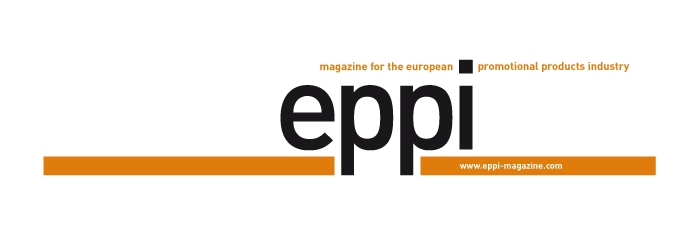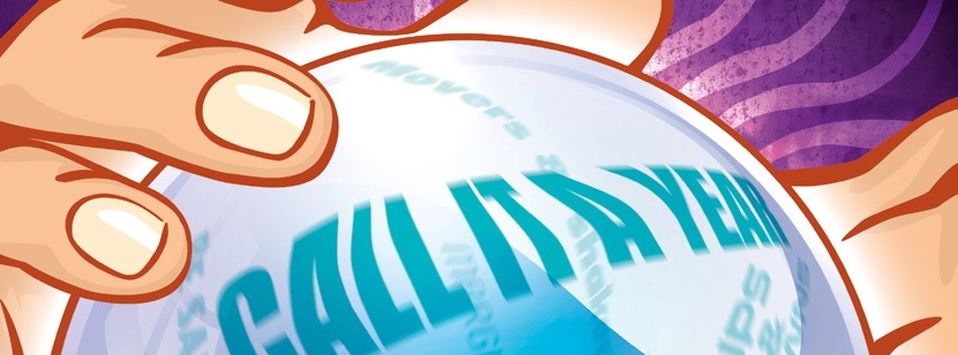Gazing into the Crystal ball: As every year, eppi magazine interviewed suppliers and distributors from the European industry on the current year. The results are as usual heterogeneous, however one trend is clear: Overall, the economy seems to be picking up again, at the same time there are increased challenges – due to setbacks such as the advertising ban in the pharmaceutical sector, new regulations and pressure from the users as well as the ever-increasing demands of the day-to-day business.
Of course, one can’t exactly rely on forecasts – they are as reliable and significant as a crystal ball, which means they should be taken with a pinch of salt. As far as the economic situation in Europe is concerned, the figures have indeed been worse in the past. The Autumn Forecast of the European Commission forecasts a 1.3% growth in the gross domestic product for the EU for 2014 and a certain upward trend is noticeable within the European promotional products industry too. Many distributors and suppliers are at least reporting small growths in turnover for 2014, others even two-digit growth rates – particularly in markets that are enjoying a relatively strong economy, such as Germany or Poland. “The number of orders is increasing, furthermore this year we had a surprisingly high number of new customers, who have recently founded their companies. I see this as an indication for a positive market development,” observed Artur Owczarska from the Polish USB specialists, Citron – European USB Warehouse. Satisfied comments also came from Great Britain. Phil Morgan, SPS, summed up: “The mood within the industry has generally been very positive this year. There has been a definite uplift in both sales and market activity compared with 2013, a trend that we see continuing.” There even seems to be positive momentum in Southern Europe, at least in parts: “We can say that we have seen an increase in advertising campaigns involving medium and large multinational companies. On the other hand, in the case of the small industries, less advertising material is being purchased. The tourism sector has achieved encouraging sales results, especially here in Italy,“ reported Mauro Chech, Responsor.
In spite of figures in the black and an overall economic climate that is more favourable than two years ago, the expectations are not too high and no mood of euphoria prevails, because in many cases earning the turnover involved a lot of hard work: The margins are still under pressure, tough price wars are raging. “Market contractions since 2008 and the associated pressures this creates did place more of a strain on the traditional channels we operate in within the industry,” observed for instance Alex Turner, Listawood. “Distributors have been much more focused on price, and much more likely to push harder for discounts to win orders.”
Pharmaceutical hammer
Price wars that are partly attributable to the fact that many distributors have tried to compensate for losses in turnover – because the ban on promotional products in the pharmaceutical sector hit the industry hard. The Transparency Code passed by the European Federation of Pharmaceutical Industries and Associations (EFPIA) banning gifts officially came into force in July 2014. Whereas there had already been an advertising ban in the pharmaceutical industry in some European states for years, for example in Great Britain, the “Pharmaceutical hammer”, i.e. the EFPIA resolution, now also hit other countries hard. For many distributors, who were strongly specialised in this area, whole groups of customers ceased to exist almost overnight. According to estimates by the German umbrella association for the promotional products industry, GWW, in Germany alone the loss in turnover for the industry hits the three-digit million mark, the situation is similar in many other countries – for example in Denmark, as Klaus Langhoff, Langhoff Promotion, reported: “The Pharma ban has indeed had an impact on our business. Many of the pharmaceutical companies have abandoned our articles. The Danish Association of the Pharmaceutical Industry (Lif) were frontrunners to put a ban on gifts – even the inexpensive ones – and have interpreted the code from EFPIA very strictly.” Initiatives by the promotional products associations striving to avert the pharma ban failed. For example, last year EPPA (European Promotional Products Association) tried in vain to influence the decision of the EFPIA. “The efforts of EPPA regarding their lobby work have brought no effect so far – the association has not succeeded in exerting any pressure or influence on EU legislation in any form,” commented Thibaut Fontaine, mcs kick&rush. The efforts of national promotional products associations, such as the GWW, who appealed to the German Federal Cartel Office against the Transparency Code at the end of 2013, were also unsuccessful – the lobbyism of the promotional products industry is powerless against the lobbyism of the pharmaceutical associations.
2014 wasn’t a good year for EPPA at all – the association spent most of it dealing with internal problems. The new President Thomas Hendriksen, who took up office at the start of the year, stepped down again in September already. This was accompanied by differences of opinion among the board of directors regarding the alignment and member structure of the European promotional products association, whose future is currently uncertain – especially since the necessary funding for the association to be able to work effectively on a European level is simply not available.
As every year, European promotional products suppliers and distributors are sharing their personal experiences, insights and opinions:
[accordian]
Klaus Langhoff: The mood has generally improved compared to 2013. Our customers have shown a greater willingness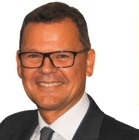 to market themselves. The business conditions for 2014 were also characterized by a stronger optimism and hope for economic recovery. As always, our industry is a relatively precise barometer of these emotions. However, since Denmark is a relatively small economy in Europe, we are very dependent on the development in our neighboring markets and the recovery still seems to face difficult conditions.
to market themselves. The business conditions for 2014 were also characterized by a stronger optimism and hope for economic recovery. As always, our industry is a relatively precise barometer of these emotions. However, since Denmark is a relatively small economy in Europe, we are very dependent on the development in our neighboring markets and the recovery still seems to face difficult conditions.
There are many ways and strategies to position oneself as a distributor. Which strategy do you pursue and why?
Klaus Langhoff: We are convinced that our articles can help companies increase their market shares and brand awareness. Our job is to act as consultants and create the perfect connection and link between our products and the message of our customers. When we succeed, our products convey messages better than anything else. Having a secure supply chain is very important for us. We were one of the first companies in Europe to obtain the Gold Certification from EPPA. In addition, our international partnership in Ippag (International Partnership for Premiums and Gifts) gives us the possibility to work with CSR issues on an unparalleled level compared to others. At the same time, the 26 countries working together in Ippag are able to share all information on suppliers, business cases and creative solutions through our intranet and regular meetings. This gives us a competitive edge, which we intend to make even more distinct.
Have the demands made by the users concerning compliance changed even more?
Klaus Langhoff: From the major companies in Denmark there is a clear focus on compliance. Both with a view to the product itself and the regulations adhered to it, but also regarding our manufacturers. Are they audited and what kind of audit have they gone through? When and by whom? Are you able to document this? Questions that were not posed very often just a couple of years ago.
What do you expect from 2015?
Klaus Langhoff: We do expect the promotional market to grow slightly and at this moment we are also employing more sales people at Langhoff Promotion. The focus on CSR, compliance and the quality of the supply chain will escalate. Multinationals will increasingly look for global solutions, and with our partnership in Ippag Global Promotions (a global joint venture of the Ippag Cooperative) we are well positioned to meet the demands. Above all, we hope for peace, love and harmony! This is a prerequisite for many things – also for economic recovery.
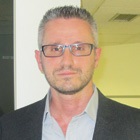
Frédéric Misseri: It was tough! The competition is not only getting tougher, the clients are getting tougher too. The most difficult aspect the industry is faced with is the fact that a lot of competitors are lying about the quality or safety standards of their products, including norms, to win an order by underbidding others with a cheaper price.
How about the relationship between distributors and suppliers – has it improved or deteriorated?
Frédéric Misseri: I am afraid it has got worse in many respects – more and more suppliers are approaching the users directly. We recently won a contract with a big pharmaceutical firm – one of our competitors in the pitch was elasto form. They shouldn’t have been there.
So how do you assess 2014 altogether?
Frédéric Misseri: Although the year was tough and our turnover was slightly lower than in 2013, in terms of profitability it has been a better year for us
How did your turnover develop in 2014 and how do you assess the year overall?
 Hans-Rudolf Steiner: Our turnover has remained stable at the previous year’s level. It was an average year, but the end-of-year business will ultimately lead to a positive result.
Hans-Rudolf Steiner: Our turnover has remained stable at the previous year’s level. It was an average year, but the end-of-year business will ultimately lead to a positive result.
What is the present mood within the Swiss promotional products industry?
Hans-Rudolf Steiner: Basically, the mood is really good, however this isn’t always reflected in the sales figures.
As a Swiss traditional manufacturer of pocket tools, Victorinox looks back on a 130-year history. In the meantime, besides pocket tools the company’s assortment also includes watches, suitcases and clothes. How important are the “additional lines” that complement the core Business?
Hans-Rudolf Steiner: Only pocket tools, domestic and professional knives, watches and suitcase are significant for the promotional products channel. In our core business – pocket and domestic knives – we offer an extremely wide spectrum of products and thus cover almost all price segments. Our watches and suitcases also play a role in the premium sector.
An “explosive issue”: the theme compliance. Have the demands you are faced with here changed?
Hans-Rudolf Steiner: This theme is very topical and also presents a challenge because we are addressed with the respective requests in such different ways. We are principally very well positioned and are now striving to achieve a simplified harmonisation.
What do you expect of 2015?
Hans-Rudolf Steiner: We think a difficult year lies ahead of us and that we will have to work very hard to generate growth.
How did your turnover and margins develop in 2014?
Volker Griesel: Our turnover showed stable development in 2014, and we can already look back on the year positively. The mood within the industry is – as always – divided and ranges from positive through to negative assessments. The margins are still under pressure, however we have noticed that many of our customers are trying to set themselves apart from their competitors by offering special services and indeed they are succeeding in doing so.
What requirements are necessary in terms of the Far East Business?
Volker Griesel: The situation in the Far East – in our factories at least – is stable, it is however characterised by constant price increases, since among others the labour costs, in China for instance, are constantly rising. Our factories undergo regular audits, carried out initially by an internal audit team before the relevant testing institutes conduct their audits. This ensures us double the amount of security.
What is your assessment of the current trade fair Scene?
Volker Griesel: Events that address the users are extremely important – especially in our case – so that we can accordingly demonstrate the high quality of our products.
How do you see the future of the PSI Show?
Volker Griesel: National trade shows enjoy a high standing in Europe today and this will not change in the future. The PSI Show in Düsseldorf is thus unfortunately no longer the only important event for the international industry. We personally would be pleased if the PSI Show were to record further growth again and continue to expand its level of internationality.
Are there particular areas where the requirements have increased significantly?
 Phil Morgan: The demand for shorter leadtimes has continued to be a challenge for suppliers. More and more business is now transacting with far shorter turnaround times. This can impact suppliers like ourselves through increased manufacturing and print labour costs. We are constantly investing in new machinery and the development of skilled team members to ensure that we work as efficiently as possible. By improving our internal processes and equipment we are in a much better position to react quickly to these orders whilst minimising price increases for our customers.
Phil Morgan: The demand for shorter leadtimes has continued to be a challenge for suppliers. More and more business is now transacting with far shorter turnaround times. This can impact suppliers like ourselves through increased manufacturing and print labour costs. We are constantly investing in new machinery and the development of skilled team members to ensure that we work as efficiently as possible. By improving our internal processes and equipment we are in a much better position to react quickly to these orders whilst minimising price increases for our customers.
Has the relationship between distributors and suppliers improved or worsened?
Phil Morgan: We’ve seen a significant improvement in the relationship with distributors. We have been working hard to partner and support our customers during this time of growth.
Is the demand for products “Made in Europe” increasing?
Phil Morgan: Definitely. We continue to see significant growth in this area of our business. The quality of the products combined with the flexibility of lower minimum order quantities and faster lead times make European products an increasingly attractive option to customers. By manufacturing and printing on-site, it gives us added flexibility and an ability to react to customers‘ needs. Product certification has become very important to customers, with demand increasing every year. In this respect, companies who produce in Europe, have an advantage of location: The great thing about manufacturing and printing items on-site is the added traceability that it offers.
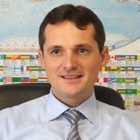 Is the demand for “Made in Europe” products increasing?
Is the demand for “Made in Europe” products increasing?
Mauro Chech: That is what we are observing and we are convinced that it is a way for suppliers to underline their professionalism. There are many advantages of “made in Europe” purchases. In addition to more simplified communications with the respective companies, there is the further advantage of fixed, reliable and much faster delivery times. There is also greater flexibility in finding ad hoc solutions for the end customer. This makes an advertising consultant’s work easier. We have always believed in exporting and recently, more and more distributors have been recommending articles from our range. They favour products made in Europe, because they are increasingly seeking high quality and good service.
What significance do certifications have?
Mauro Chech: I don’t think certifications increase sales, but they have become indispensable because they are often required by the applicable standards. In this connection, we feel it is important to protect the consumer.
How do you assess the work and achievements of the industry associations?
Mauro Chech: I think it is important to collaborate with associations. I’ve always believed that unity creates strength. At the moment, I am supporting the Italian industry association, Assoprom, by striving to participate in the initiatives taken by them and promoting participation, taking on the position of local representative for Northern Italy. The goal is to get the best market players involved and to raise awareness among the users to buy from qualified companies.
How has 2014 been for the British industry?
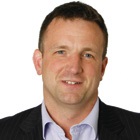 Alex Turner: Business has been picking up this year. We’re seeing the number of orders increasing sharply and larger projects seem to be coming through that perhaps were on hold before. Speaking with distributor customers in the UK, the pattern for them seems to be similar – many report that they’re busy and many have had record sales months in 2014.
Alex Turner: Business has been picking up this year. We’re seeing the number of orders increasing sharply and larger projects seem to be coming through that perhaps were on hold before. Speaking with distributor customers in the UK, the pattern for them seems to be similar – many report that they’re busy and many have had record sales months in 2014.
Is the demand for products “Made in Europe” increasing?
Alex Turner: It’s hard to say if it’s increasing or not. You certainly hear distributors talking about wanting to develop their supply chains across the EU, but often in conjunction with the supply chains they have in the Far East for other projects. We continue to invest in new technology in our European manufacturing plant to keep price points as low as possible and to continue to manufacture in Europe.
How about the relationship between distributors and suppliers?
Alex Turner: I would say it’s been pretty stable. When there’s less business and profit to go around it creates a strain but I don’t believe it’s continuing to worsen.
How do you rate the work and achievements of the industry associations?
Alex Turner: In the UK the BPMA (British Promotional Merchandise Association) has been very active, trying to deliver value to its members. There’s a great deal the association wants to do, but like the rest of us they’re managing a finite resource. However, over the last couple of years, they’ve held the first industry conference designed to encourage best practice and to bring suppliers, distributors and other key industry stakeholders together. They’ve also conducted some excellent research. I would encourage businesses operating in our industry to engage with their respective trade associations and help them to do what they can do to develop and improve our industry for the mutual benefit of us all. They’re basically all membership associations and the more of us that get involved, the greater the resource they will have at their disposal to help us.
Was it a good year for your company?
 Colin Loughran: Thankfully, Goldstar’s turnover has grown beyond all expectations in 2014. We’ve successfully launched into the German, UK and Irish markets and we are enjoying significant growth in France. It’s exciting times for Goldstar and we will strengthen our product and service offerings as well as our team in 2015. The margins, however, are under pressure – the market for writing instruments is extremely competitive.
Colin Loughran: Thankfully, Goldstar’s turnover has grown beyond all expectations in 2014. We’ve successfully launched into the German, UK and Irish markets and we are enjoying significant growth in France. It’s exciting times for Goldstar and we will strengthen our product and service offerings as well as our team in 2015. The margins, however, are under pressure – the market for writing instruments is extremely competitive.
Has the relationship between distributors and suppliers improved or worsened as a result?
Colin Loughran: I can only speak for Goldstar in this matter and our relationships are certainly improving.
Which trade fairs did you attend in 2014 and why?
Colin Loughran: In 2014 Goldstar attended PSI as well as several national trade shows: bwg Trend, BWL Newsweek, CTCO, Premium Sourcing, Trade Only and Sourcing City Marketplace. These trade shows for the most part are a cost effective way of meeting our customers and prospects. More and more distributors are having their own end user shows and they expect their distributors to come and exhibit with them. This trend is definitely increasing and of course there is a cost associated with this.
Did you have a good year?
 Artur Owczarski: To be honest, we had a fantastic year. We were able to increase our turnover by 25%. This is partly attributable to the fact that we have invested in new machines and in our marketing. We also succeeded in accelerating our production process and in sinking prices. The framework conditions were also favourable – the Polish market is currently flourishing. As far as I know, all of the major players have recorded significant growth this year.
Artur Owczarski: To be honest, we had a fantastic year. We were able to increase our turnover by 25%. This is partly attributable to the fact that we have invested in new machines and in our marketing. We also succeeded in accelerating our production process and in sinking prices. The framework conditions were also favourable – the Polish market is currently flourishing. As far as I know, all of the major players have recorded significant growth this year.
So the mood on the market is positive?
Artur Owczarski: Yes, the mood is good, but not just in Poland. Overall, after many years the crisis seems to be coming to an end. This year, we had a surprisingly high number of new customers, who have recently founded their companies. Not all of these new companies may survive, but a lot of people obviously feel motivated enough to put their own ideas into practice. We welcome such new market participants: Even if the big customers are ultimately decisive for the market development and for our growth as a supplier, having a large number of smaller customers is a significant factor that shouldn’t be neglected either.
Which trade fairs did you participate at in 2014?
Artur Owczarski: We have been exhibiting at the RemaDays Warsaw for many years – we participated for the eleventh time this year. We were represented at the PSI Show for the third time. Visiting the Hong Kong Gifts & Premium Fair is an obligatory date for us. What do you think the coming year has in store for the European industry? If the situation in the Middle East and in the Ukraine don’t have a negative effect on the economic climate in Europe, I am sure that 2015 will be a good year. After several years of recession, it is time for some movement. Of course, I know that is easier to say in Poland than in other European countries: The economy here has been experiencing rapid development since 2008 and we were the only “green island” on the European map for a long time. After a small slump in the year 2013, Poland is expecting the gross domestic product to rise by over 3% in 2014, which allows me to be optimistic.
How did your company perform in 2014?
 Thibaut Fontaine: Of course, the year isn’t over yet, but up to now we have increased our turnover by approx. 10%. So, we are very happy with our results in 2014.
Thibaut Fontaine: Of course, the year isn’t over yet, but up to now we have increased our turnover by approx. 10%. So, we are very happy with our results in 2014.
The last two years have brought some big mergers in the industry. Will this development continue?
Thibaut Fontaine: I think so. Such developments are the industry’s way to adapt to the client’s needs. Many multinational clients are looking for a one-stop model. Our company kick&rush merged itself four years ago with the German company mcs – that had many advantages for our customers of course. It also opens up huge synergy effects for us: We can bundle resources and handle global orders in several countries locally thanks to our representatives in Belgium, China, Germany and France.
Which types of distributors will survive in the long run and which won’t?
Thibaut Fontaine: I am convinced that a mixture between professional sourcing and high creativity value will be the key for success in the coming years. To avoid pressure on our margins, we have developed a lot of new products, new processes and exclusivities. Distributors, who are still working the same way as five or ten years ago, will inevitably show negative growth because they will lose margin and clients.
How do you rate the work and achievements of the industry associations?
Thibaut Fontaine: There are many national associations in Europe, which are very active and do good work. For example, the French association 2fpco (Federation Française des Professionnels de la Communication par l’Objet) offers a high level of quality and operates very professionally. BAPP (Belgian Association of Promotional Products) has also achieved a great deal over the past years – including providing excellent user communication tools.
High workload
Many industry players had little time for association politics in 2014 anyway, because they were completely tied up with the manifold demands of the day-to-day business. For example, on the one hand the increasing flow of new regulations that have to be observed, implemented and complied with. The theme compliance is becoming more and more of an issue because the demands that many users, primarily big groups, keep placing on the industry, are enormous. Frequently, the distributors have to fill out pages of declarations in order to be allowed to even sell goods to certain companies. Frédéric Misseri, LAGARDERE, cited an example: “A very large food company has recently substantially increased its safety policy. They have created a ‘Safety’ department, which controls all the products distributed or sold that bear their logo. The consequence for us is that we need to provide them with factory audits, the relevant certificates and a bill of materials for any product, regardless of whether it is just ten pens or 100,000 toys. In many respects, the level of requirements differs greatly compared to the situation just a few years ago.”
Requirements that are passed on along the entire supply chain. Since of course the respective suppliers have to present the corresponding certificates, often together with a whole row of declarations of undertaking, intent or consent. On top of this the suppliers are faced with the additional demands and needs of the trade regarding faster delivery, free samples, marketing support or special requirements of all sorts, with the result that many suppliers have the feeling that they are battling away on several fronts: “We are faced with ever increasing testing costs as a result of the REACH requirements, as well as the increased personnel costs that are necessary in order to uphold the high level of services we provide to the trade with their increased demands and additional tasks for us,” reported Volker Griesel, Fare, and Colin Loughran, Goldstar Europe, added: “I believe the distributors need and expect more and more support from their suppliers. One of the reasons for this is, for example, the pressure from the users, who are demanding faster lead-times, faster quote responses and faster artwork proofs.”
This leads to further tension – particularly when the distributors or suppliers are breaking away from the traditional distribution channels in order to gain advantages in the battle against tight margins. Thus, the partner-like relationships between the suppliers and distributors involve a lot of hard work.
Heterogeneous trade fair scene
After dealing with the daily order acceptance and processing tasks, the companies then still have to address the marketing side of the business. Prior to the implementation of cost-intensive measures such as catalogues, mailings and attending trade fairs, they have to deal with the strategic planning, which encompasses a rising number of parameters – one example is the increased decentralisation of the trade fair scene. The national shows are gaining in significance and are becoming more important for the export business, whereas the PSI Show has apparently lost in significance as an international platform. For instance, at the CTCO at the beginning of the year, around 40% of the exhibitors came from abroad, whereas at the last PSI Show 47% of the visitors came from Germany. For export-oriented suppliers it no longer suffices to exhibit exclusively in Düsseldorf. Many have to decide year after year which local shows they should present their products and services to the international promotional products trade at. A decision that entails much more than the mere trade fair presence, it namely also encompasses factors such as multilingual catalogues and sales personnel.
And these are just the points involved in internal trade marketing, on top of that there is the issue of end-user communications. Attaining high recognition for the own brand name and creating the corresponding desire are in the meantime commonplace. “The relationship between push and pull measures plays a major role in our marketing activities. We follow this approach both for our print advertising and at trade fairs. We wouldn’t want to do without events that target the end-user,” commented Hans-Rudolf Steiner, Victorinox. As such, suppliers are more than ever before faced with the decision as to which changes they should make first. A question of priorities that especially gains significance when the economy picks up even further.
However, everyone is probably happier with the current situation despite all its challenges than if the climate was characterised by further standstill. Many of those companies that streamlined, realigned and consolidated their businesses during the crisis years, are now reaping the rewards for their efforts. In spite of the restrictions, self-imposed promotional products bans and compliance straitjackets, 2014 still offered plenty of room for creativity. Many suppliers took the market by surprise with new, unexpected expansions to their line-ups, the Football World Cup in Brazil shrouded everything in green and white and new surveys underpinned the popularity of intelligent promotional products. All of which are reasons why gazing into the crystal ball gives rise to optimism on the whole.


